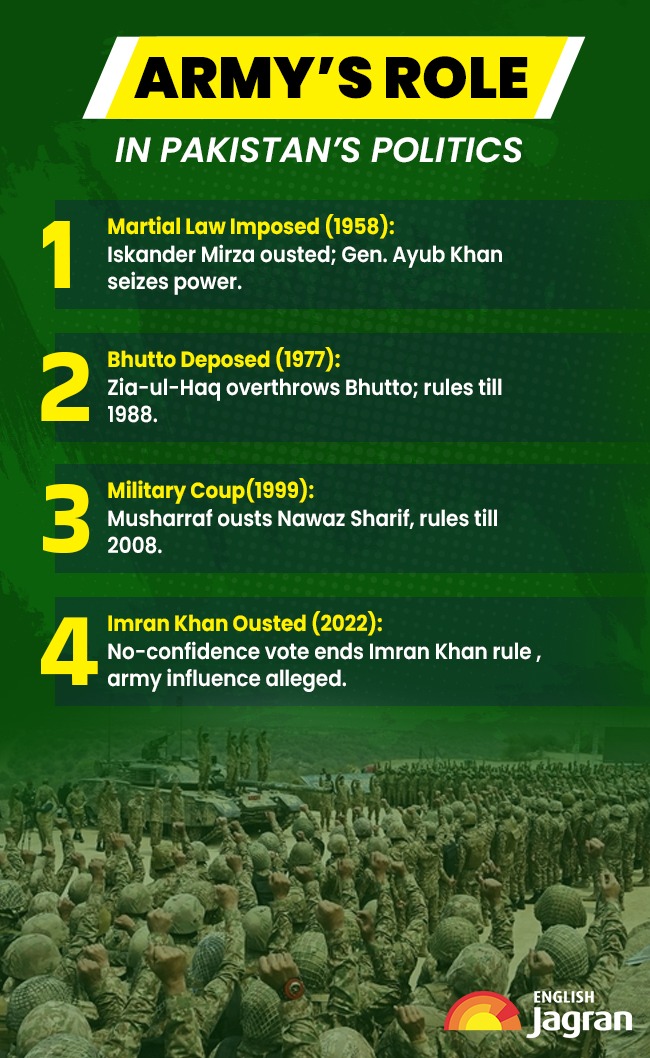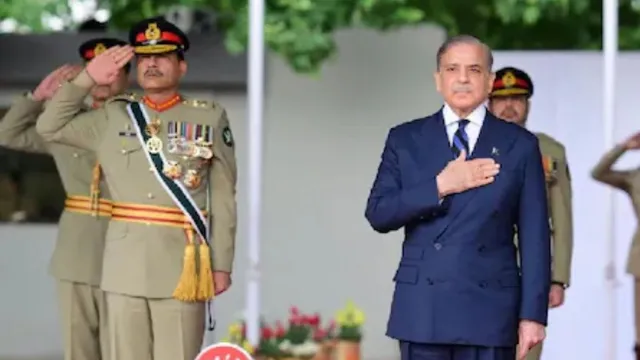- By Supratik Das
- Sun, 11 May 2025 12:00 PM (IST)
- Source:JND
After series of precised attacks under India’s retaliatory Operation Sindoor, Pakistan reached out through backchannel diplomacy and urged for a ceasefire brokered with help from the United States. But it was Pakistan’s military that violated the truce within mere hours of the agreement. On May 10, only hours after India and Pakistan had allegedly agreed to a US mediated ceasefire, Pakistan's military violated the truce. According to MEA officials Shelling on the Line of Control (LoC) resumed, and armed drones were seen entering Indian airspace. The move came minutes after Prime Minister Shehbaz Sharif publicly acknowledged the ceasefire agreement. His administration asserted that Pakistan remained on the path of de-escalation.
Now the question among South Asia's diplomatic community has resurfaced that Who effectively controls Pakistan, the elected Prime Minister Shehbaz Sharif or the all-powerful military leadership in Rawalpindi? The shadow of the military looms large over Pakistan's democratic institution once again as tensions rise following the deadly terror strike in Pahalgam, which claimed 26 civilian lives. India's response, Operation Sindoor, a series of precised strikes on terror camps in Pakistan and Pakistan-occupied Kashmir (PoK) has rekindled international attention on Pakistan's military establishment and its overarching influence on foreign and domestic policy.
Civilian Rule In Name Only?
This is no new play in Pakistan's political script. Ever since its creation in 1947, Pakistan has swung between military regimes and unstable civilian regimes. But even in times of democratic change, the military has had decisive roles in major policy sectors likeforeign policy, internal security, media management, and judicial appointments. The ceasefire breach reconfirms the deep-seated imbalance. If Sharif actually favored the ceasefire, yet the army went against it, it is an indication of either a communication failure between the two power centers or a deliberate military rebuff of civilian rule.
The two nations agreed to stop all military operations. This was decided in a high-level discussion between India and Pakistan's Directors General of Military Operations (DGMOs). But just a few hours later, the Ministry of External Affairs (MEA) confirmed violations of the Line of Control (LoC) in Jammu and Kashmir.
Pattern Of Political Subversion
This is not the first time Pakistan's military has undercut or directly overruled its civilian government. Ever since it gained independence in 1947, Pakistan's military has ruled the nation directly for more than 30 years, staging three significant coups and still maintaining control even under civilian regimes. No Prime Minister in Pakistani history has ever served a complete five-year term, most have been forced into exile, jailed, or worse.
• The First Military Coup: In 1958, when President Iskander Mirza suspended the Constitution and declared martial law, appointing General Ayub Khan Chief Martial Law Administrator. Ayub Khan overthrew Mirza in a few weeks and established an 11-year military regime.
• Bhutto's Fall and Zia-ul-Haq's Rise: General Zia-ul-Haq deposed Prime Minister Zulfikar Ali Bhutto, alleging electoral fraud and political turmoil. Bhutto was subsequently sentenced to death controversially and executed in 1979. Zia governed Pakistan until he died in a plane crash in 1988.
• Musharraf's Takeover: The Pakistan military ousted Nawaz Sharif, suspended the constitution, and placed General Pervez Musharraf in power as the nation's new chief. He remained in charge until he resigned in 2008.
• Imran Khan's Removal: In April 2022, Imran Khan was ousted from power through a no-confidence vote over disagreement over foreign policy and Khan's aggressive opposition to top army generals.

Recent Examples Highlight Continuity
• In 2018, allegations emerged that the military helped Imran Khan’s Pakistan Tehreek-e-Insaf (PTI) win the elections through intimidation and media blackouts.
• In 2020, the army was reportedly involved in the arrest of opposition leader Maryam Nawaz’s husband, Captain (Retd.) Safdar, which led to widespread protests and riots.
• In 2024, ahead of general elections, several PTI candidates were disqualified or jailed—moves critics say were encouraged by the military to weaken Khan’s political comeback.
Even in democratic periods, the Pakistan Army has maintained overriding control over foreign affairs, defense, judiciary, and media. It has been blamed for rigging elections, backing or marginalizing political parties, and orchestrating judicial decisions. The ceasefire violation is another example that defies democratic rule in Pakistan is a weak illusion.

